#practical life
Text

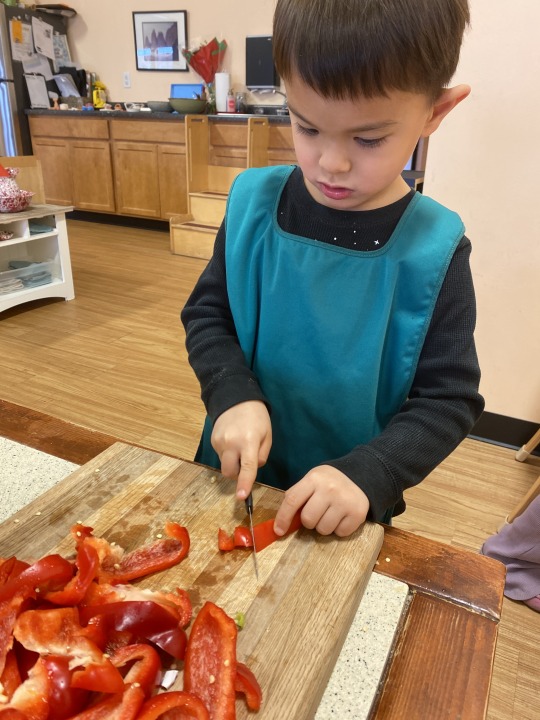
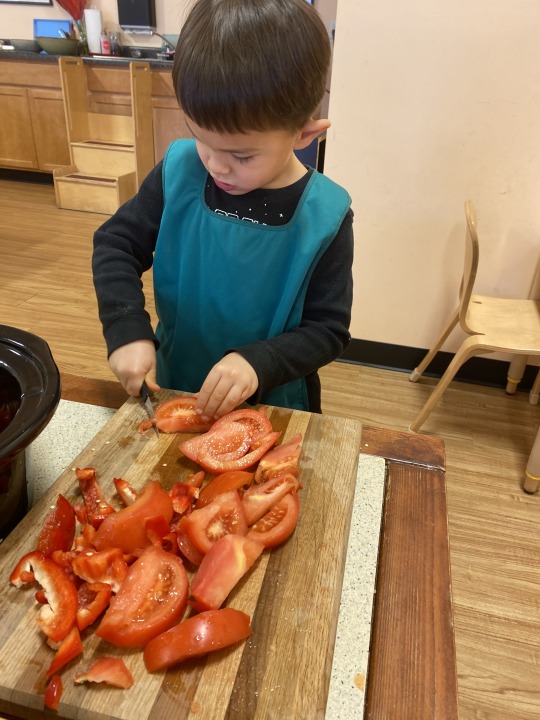
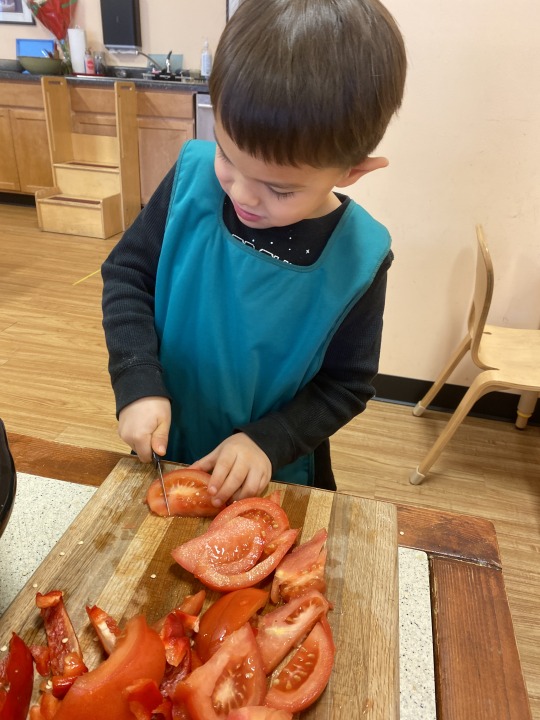
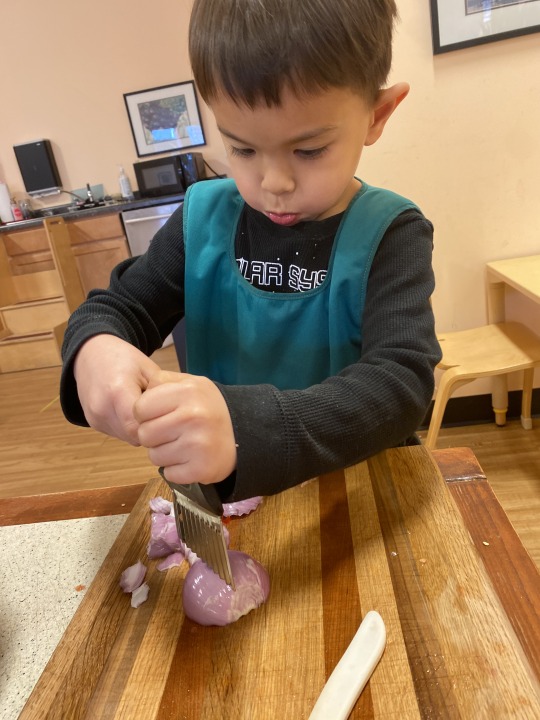

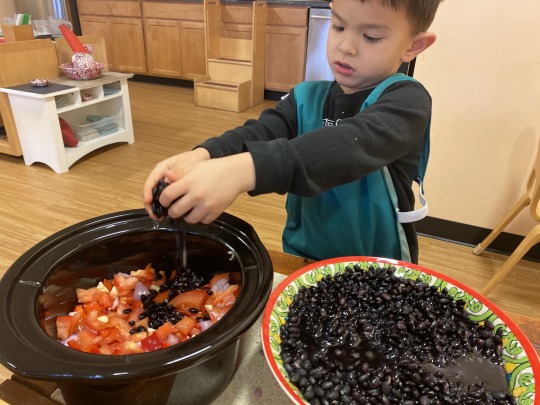
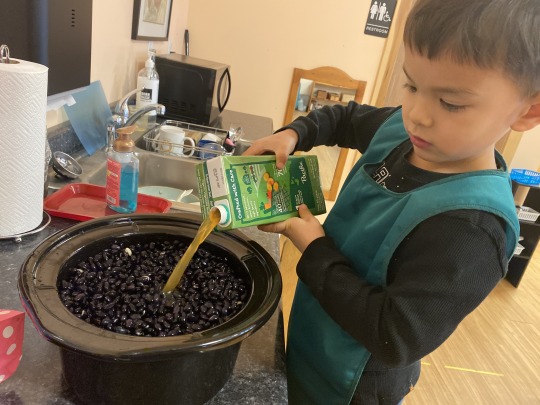
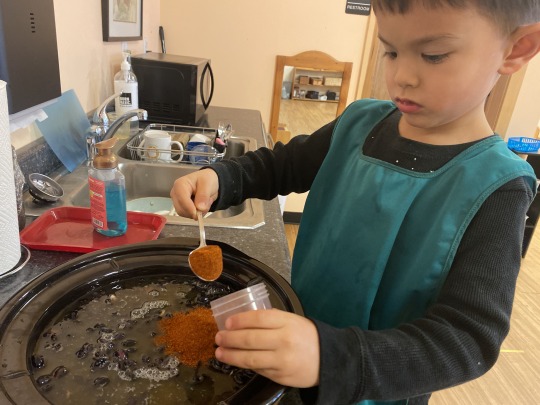

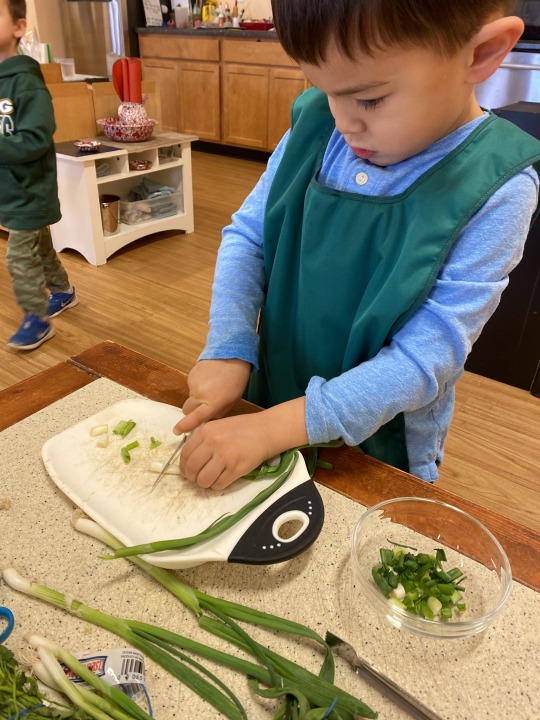
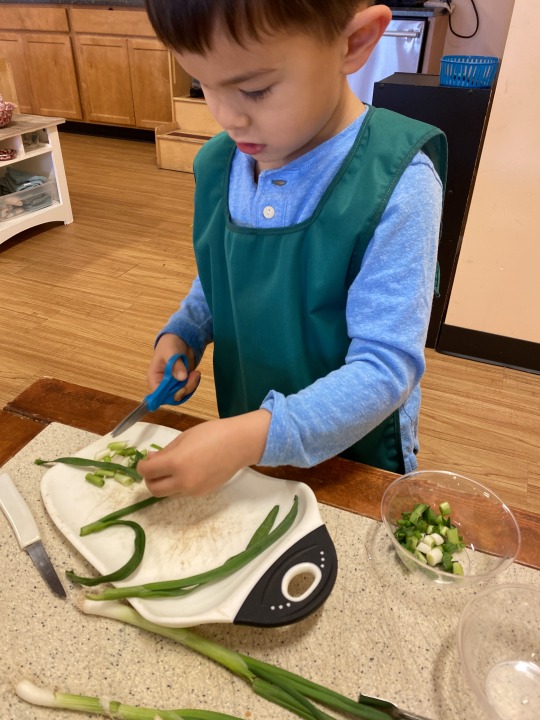
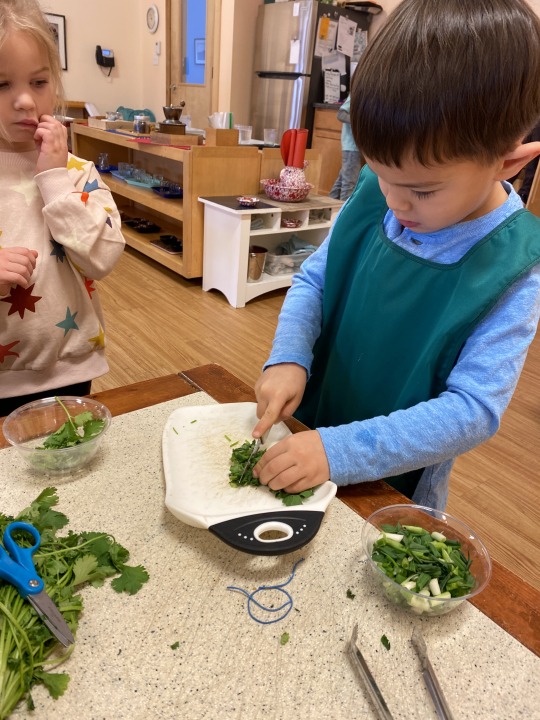
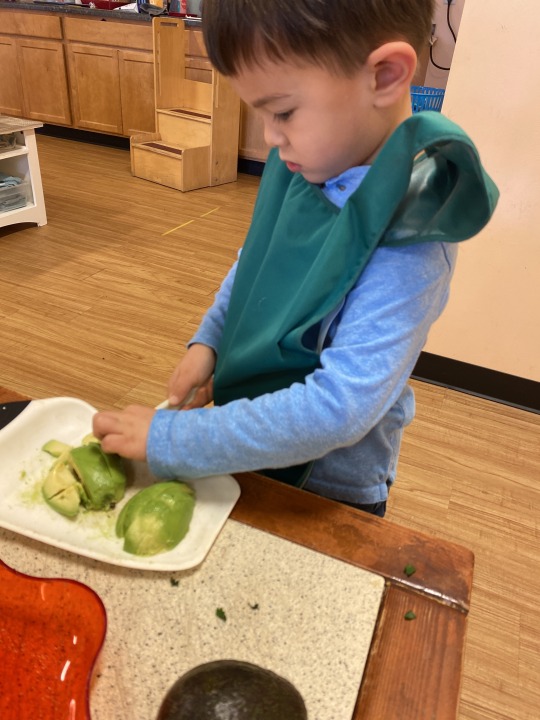

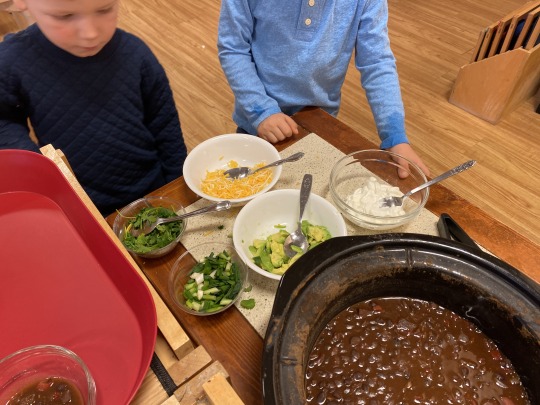


Chef of the Week: Meric
Wow! That was the general feeling in the classroom through Meric's soup making this week. First step was a science experiment. Meric soaked the black beans in a big bowl - making sure they were covered. Prior to the soaking, he and some of his classmates felt the beans and commented on how hard and smooth they were. When asked what they thought would happen when we soaked the beans, nobody hazarded a guess. The next day, when Meric got to the bowl of beans, he looked startled and exclaimed, "What happened to the water?" He asked a few of his classmates standing around and finally they concluded that it was all "in the beans" and figured out that must be the reason the beans were bigger and softer now. He diced the red pepper and tomatoes slowly and methodically and then came to the onions. Our classroom technique of holding a sip of water in one's mouth as you chop onions was tried - Meric worked hard to cut those onions but a few minutes later asked for help because the trick was "not working for my eyes"! He minced the garlic after that. Then he drained and added the soaked beans to the pot. After that the broth and spices went in and Meric gave it all a good stir. The soup cooked overnight. Just before serving his soup, Meric diced green onions, cilantro and cut up an avocado. He created a small selection of toppings, including shredded cheese and sour cream. The students were stunned when they saw the whole set-up! And they greatly enjoyed creating their own bowl of Meric's Black Bean Soup. Some were trying cilantro and green onions for the first time and many of them complimented Meric on his soup ! A novel experiment for sure!!
6 notes
·
View notes
Text

Early Childhood-Flower Arranging
Look at that focus and concentration! Flower Arranging and other Montessori Practical Life activities are used to help children develop independence and logical thought. Each step of these activities satisfies the child’s innate desire to imitate the “work” that they see adults completing daily. For the Flower Arranging work, children exercise their fine and gross motor skills as they carry a tray, a vase, and a pitcher of water, all slowly and carefully. They practice concentration as they admire the beautiful materials available and choose just the right vase and flowers. They pour water through a funnel, using their skills of estimation to determine when it’s time to stop. They practice their cutting skills while again estimating and determining just how much of the stem they need to trim off to make the flower fit into the vase. Their attention to detail alerts them to any spills or drips, which they carefully wipe up with a sponge or a towel, and they practice following through with a sequence of steps. The whole activity is engaging and calming for the student, providing an opportunity for them to contribute to the beautification of the environment for all to enjoy.
#beautify the environment#practical life#purposeful activity#order#concentration#coordination#independence#interdependence#intrinsic motivation#hands on learning#care of environment#tma#montessori#private school#arlingtontx#arlington#texas#infant#nido#toddler#early childhood#preschool#kindergarten#elementary#education#private education#nontraditional#the montessori academy of arlington
2 notes
·
View notes
Quote
However, when parents are uncertain about how to respond to their child involved in a practical-life activity, they need to remember that collaboration is the basis of all healthy human relationships.
Montessori From The Start, p.98
Polk Lillard and Lillard Jessen
2 notes
·
View notes
Text
The aggregation of the spiritual life from the practical life is a curse that falls impartially upon both sides of our existence. A society that gives to one class all the opportunities for leisure, and to another all the burdens of work, dooms both classes to spiritual sterility.
— Lewis Mumford
#life quotes#lifequotes#light#quote#quote of the day#quoteoftheday#quotes#wisdom#Lewis Mumford#division#separation#aggregation#spiritual life#practical life#mundane life#curse#existence#spiritual dimension#physical dimension#society#socio-economic organization#organization of society#order#social classes#opportunity#leisure#work#labour#burden#sterility
1 note
·
View note
Text
Deity who's unacquainted with concept of evolution creating a world with, like, twelve different kinds of creatures, thinking "yes, that's a good number – nice and symmetrical", then going on vacation for a couple million years and being very upset at what's waiting for them when they get back.
#concepts#theology#evolution#worldbuilding#they keep throwing extinction events at the world in an effort to get a clean slate and start over#life just keeps getting weirder in response#they're practically at their wits' end#and that's a lot of wits to be at the end of
53K notes
·
View notes
Text
Today my therapist introduced me to a concept surrounding disability that she called "hLep".
Which is when you - in this case, you are a disabled person - ask someone for help ("I can't drink almond milk so can you get me some whole milk?", or "Please call Donna and ask her to pick up the car for me."), and they say yes, and then they do something that is not what you asked for but is what they think you should have asked for ("I know you said you wanted whole, but I got you skim milk because it's better for you!", "I didn't want to ruin Donna's day by asking her that, so I spent your money on an expensive towing service!") And then if you get annoyed at them for ignoring what you actually asked for - and often it has already happened repeatedly - they get angry because they "were just helping you! You should be grateful!!"
And my therapist pointed out that this is not "help", it's "hLep".
Sure, it looks like help; it kind of sounds like help too; and if it was adjusted just a little bit, it could be help. But it's not help. It's hLep.
At its best, it is patronizing and makes a person feel unvalued and un-listened-to. Always, it reinforces the false idea that disabled people can't be trusted with our own care. And at its worst, it results in disabled people losing our freedom and control over our lives, and also being unable to actually access what we need to survive.
So please, when a disabled person asks you for help on something, don't be a hLeper, be a helper! In other words: they know better than you what they need, and the best way you can honor the trust they've put in you is to believe that!
Also, I want to be very clear that the "getting angry at a disabled person's attempts to point out harmful behavior" part of this makes the whole thing WAY worse. Like it'd be one thing if my roommate bought me some passive-aggressive skim milk, but then they heard what I had to say, and they apologized and did better in the future - our relationship could bounce back from that. But it is very much another thing to have a crying shouting match with someone who is furious at you for saying something they did was ableist. Like, Christ, Jessica, remind me to never ask for your support ever again! You make me feel like if I asked you to call 911, you'd order a pizza because you know I'll feel better once I eat something!!
Edit: crediting my therapist by name with her permission - this term was coined by Nahime Aguirre Mtanous!
Edit again: I made an optional follow-up to this post after seeing the responses. Might help somebody. CW for me frankly talking about how dangerous hLep really is.
#hlep#original#mental health#my sympathies and empathies to anyone who has to rely on this kind of hlep to get what they need.#the people in my life who most need to see this post are my family but even if they did I sincerely doubt they would internalize it#i've tried to break thru to them so many times it makes my head hurt. so i am focusing on boundaries and on finding other forms of support#and this thing i learned today helps me validate those boundaries. the example with the milk was from my therapist.#the example with the towing company was a real thing that happened with my parents a few months ago while I was age 28. 28!#a full adult age! it is so infantilizing as a disabled adult to seek assistance and support from ableist parents.#they were real mad i was mad tho. and the spoons i spent trying to explain it were only the latest in a long line of#huge family-related spoon expenditures. distance and the ability to enforce boundaries helps. haven't talked to sisters for literally the#longest period of my whole life. people really believe that if they love you and try to help you they can do no wrong.#and those people are NOT great allies to the chronically sick folks in their lives.#you can adore someone and still fuck up and hurt them so bad. will your pride refuse to accept what you've done and lash out instead?#or will you have courage and be kind? will you learn and grow? all of us have prejudices and practices we are not yet aware of.#no one is pure. but will you be kind? will you be a good friend? will you grow? i hope i grow. i hope i always make the choice to grow.#i hope with every year i age i get better and better at making people feel the opposite of how my family's ableism has made me feel#i will see them seen and hear them heard and smile at their smiles. make them feel smart and held and strong.#just like i do now but even better! i am always learning better ways to be kind so i don't see why i would stop
17K notes
·
View notes
Text
Did a small practice :]🌟
#my art#animation#video#sundrop#fnaf sun#help wanted 2#help wanted spoilers#I’m fighting procreate dream with my life#it works fine with small practices#oh hw2 voice lines are so good for dialogue practices#there are so many ups n downs packed in just one small line#🤌✨#might do more#i have a few saved
7K notes
·
View notes
Text
The Road to Be Rich–4 Rich's Habits
The different mindset, the way of thinking, and habits are characteristics of rich person.
Among them, let me introduce 4 habits they’ve got.
First, they used to text rather than call due to usability and saving time.
Second, they know what is advantages and disadvantaged on them so make a quick decision related to saving time and protecting their values.
Third, they only use the money on…

View On WordPress
0 notes
Text
Horsegirl bdubs getting on his horse (real!!)
#bdubs#bdoubleo100#hermitcraft#secret life#my art#lat#animation#procreate dreams#teehee#this is based on a tweet where someone compared bdubs to barbie getting on her hirse in 3 musketeers#and i found it funny#so this happend#good practice for dreams so lets goo
7K notes
·
View notes
Text

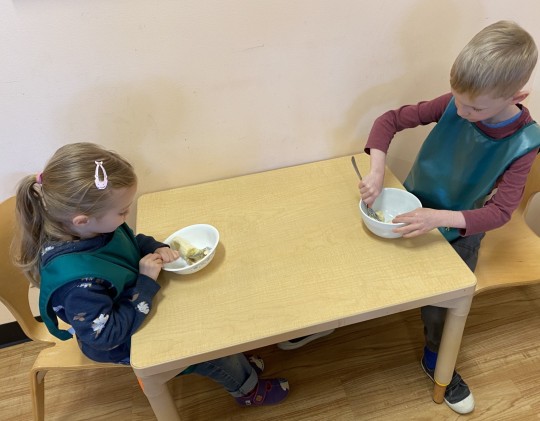
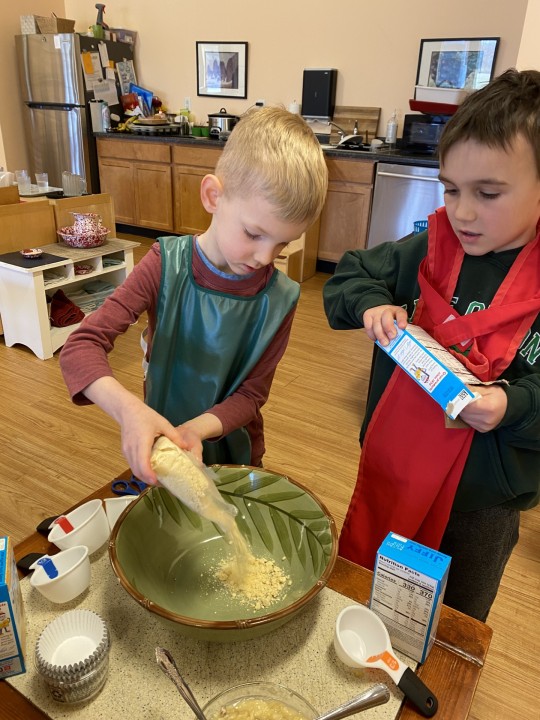


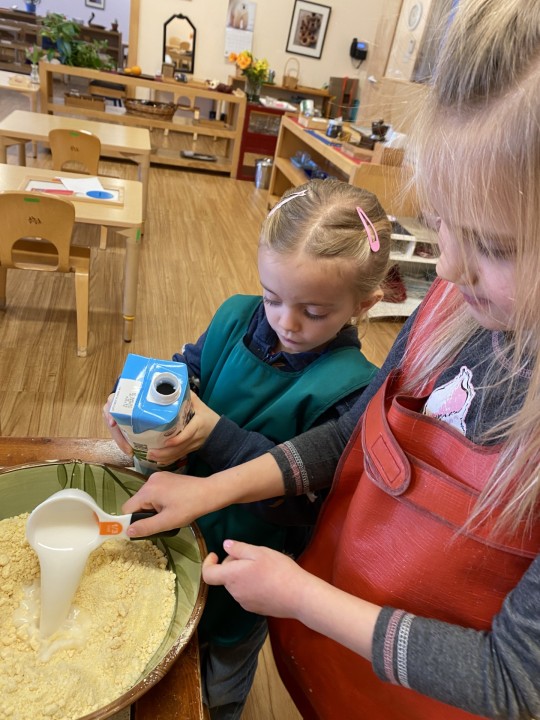
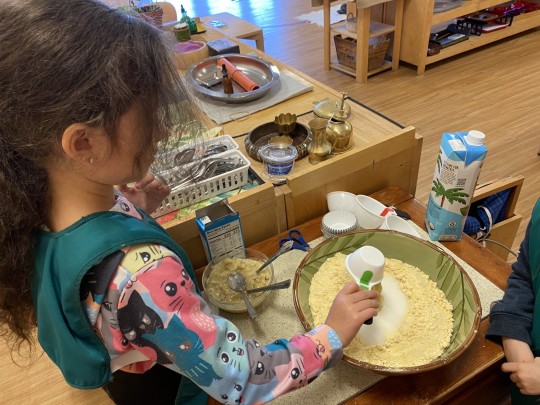
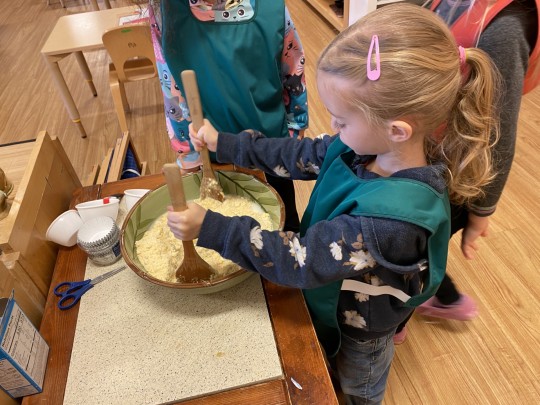

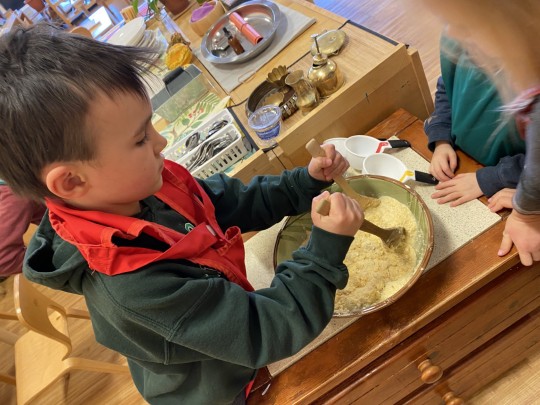
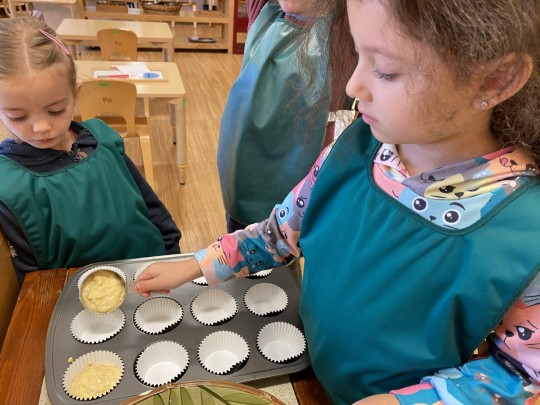
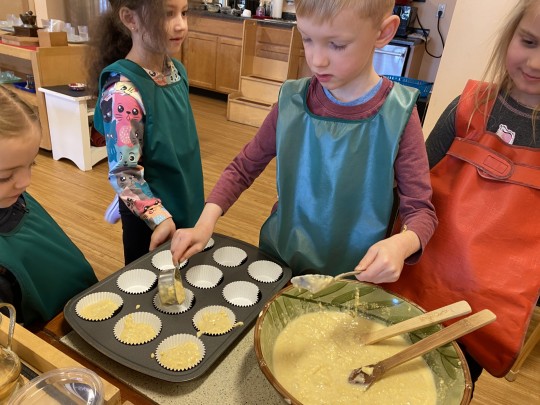
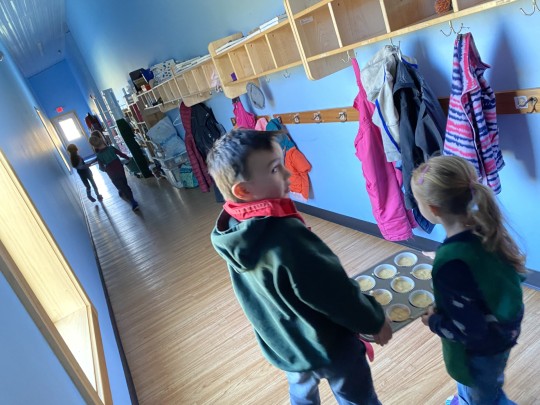

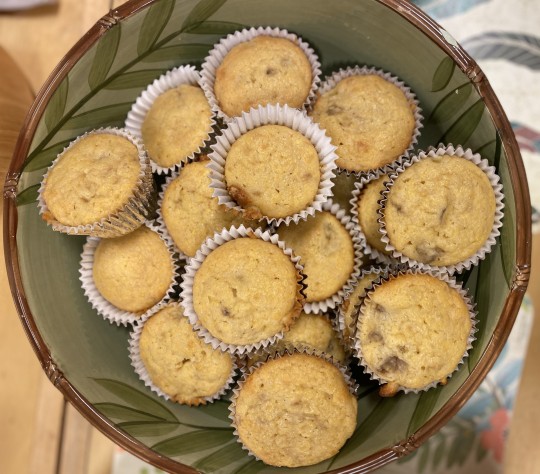
Corn Muffins the final year students made for their Community Harvest Feast!
6 notes
·
View notes
Text

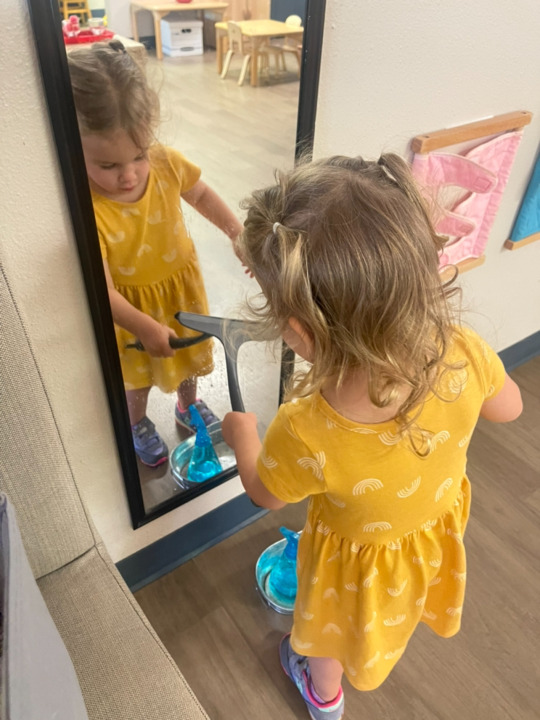
Toddler - Practical Life, Care of Environment
Most ordinary tasks that we do without much thought are new and engaging challenges for our students. The Practical Life curriculum in a Montessori classroom provides a scope and sequence for these everyday routines and practices. By engaging in meaningful activities and using ordinary objects with purposeful ends, the students develop real abilities, which give them independence and control of their lives. The students learn to focus their attention for the entirety of an activity and, upon completion, have a deep sense of fulfilment. Therefore, the aim of these activities is not only practical but also developmental. Through these activities, children develop concentration, independence, coordination of movement, inner discipline, and independence.
#purposeful activity#hands on learning#experiential learning#practical life#care of environment#order#concentration#coordination#independence#routines#tma#montessori#private school#arlingtontx#arlington#texas#infant#toddler#early childhood#preschool#kindergarten#elementary#education#private education#nontraditional#the montessori academy of arlington
2 notes
·
View notes
Text

[Day 154]
Unhinged people 💥💥💥
#dddaily4sherin#ldshadowlady#smallishbeans#mumbo jumbo#ethoslab#grian#goodtimeswithscar#pearlescentmoon#secret life#secret life smp#traffic smp#trafficblr#my art#Thought I wanna practice drawing some of these peeps more so why not also practice expressions#and then I proceeded to add colors HEMELEPKWPA
5K notes
·
View notes
Text
ever since i was a little girl i knew i wanted to speculate about the sexual and romantic undertones of celebrities’ professional relationships
#thinking about the larry thing again. all my life i’ve been a believer 🙏#obviously many times of misguided beliefs were there before i like. learned how the world works. now i practice rpf discernment#but quite frankly there’s nothing like the drug of looking at star wars ot promo and being like man.#carrie fisher and harrison ford definitely fucked didn’t they.#and then for carrie fisher to drop the princess diarist and be like yeah me and harrison had the most torrid 70s affair#you can possibly imagine.#VINDICATIONNNNN#quite frankly they are the reason i still believe something similar happened with gillovny. we just need the memoir drop#rpf quiz
4K notes
·
View notes
Text

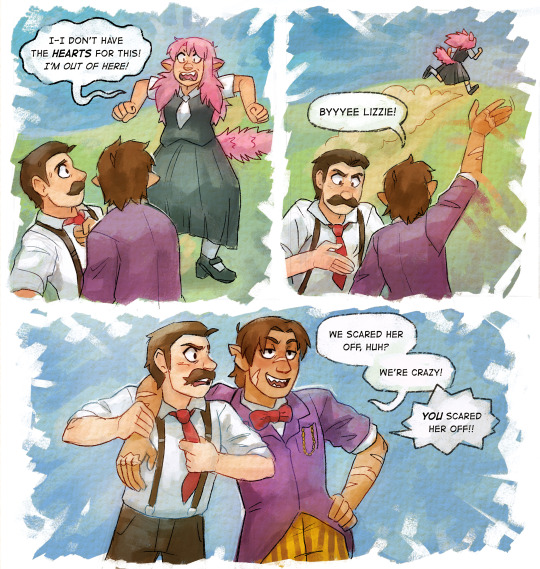
He plays the game like no one else XD
(my minecraft + mcyt tag)
#these comics are fun practice bc i dont have to script em lol#it just writes itself#secret life smp#trafficblr#goodtimeswithscar#ldshadowlady#mumbo jumbo#life smp#life series#slsmp#fanart#calocraft
3K notes
·
View notes
Text
Detachable junk sounds good in theory, but I can't help but feel that the plug-and-play approach is just asking for trouble. Forget about USB compatibility – I want something mounted on a threaded rod that I have to spend several minutes turning into place, and it makes an obtrusive squeaka-squeaka-squeaka noise the whole time because I'm a dumbass and forgot to lubricate it. I want something that needs to be seated and secured like the parallel data cable from a 1950s computer. I want something where removing it requires disengaging a series of four interlocking mechanical toggles, and I want each of those toggles to go ka-chunk.
#life#penis mention#transhumanism#(ish)#swearing#i want it to make a discordant thrumming noise and emit wispy clouds of dry ice vapour when i deploy it for absolutely no practical reason
9K notes
·
View notes
Note
how do you write a liar?
How to Write Liars Believably
Language
The motive of every goal is the make the lie seem plausible while taking blame off the speaker, so liars will often project what they say to a third party: "Katie said that..."
Referring to third parties as "they" rather than he or she
In the case of a deliberate lie prepped beforehand, there will be an overuse of specific names (rather than pronouns) as the speaker tries to get the details right.
Overuse of non-committal words like "something may have happened"
Masking or obscuring facts like "to the best of my knowledge" and “it is extremely unlikely," etc.
Avoiding answers to specific, pressing questions
Voice
There's isn't a set tone/speed/style of speaking, but your character's speech patten will differ from his normal one.
People tend to speak faster when they're nervous and are not used to lying.
Body Language
Covering their mouth
Constantly touching their nose
fidgeting, squirming or breaking eye contact
turning away, blinking faster, or clutching a comfort object like a cushion as they speak
nostril flaring, rapid shallow breathing or slow deep breaths, lip biting, contracting, sitting on your hands, or drumming your fingers.
Highly-trained liars have mastered the art of compensation by freezing their bodies and looking at you straight in the eye.
Trained liars can also be experts in the art of looking relaxed. They sit back, put their feet up on the table and hands behind their head.
For deliberate lies, the character may even carefully control his body language, as though his is actually putting on a show
The Four Types of Liars
Deceitful: those who lie to others about facts
2. Delusional: those who lie to themselves about facts
3. Duplicitious: those who lie to others about their values
Lying about values can be even more corrosive to relationships than lying about facts.
4. Demoralized: those who lie to themselves about their values
Additional Notes
Genuine smiles or laughs are hard to fake
Exaggerations of words (that would normally not be emphasized) or exaggerated body language
Many savvy detectives ask suspects to tell the story in reverse or non-linear fashion to expose a lie. They often ask unexpected, or seemingly irrelevant questions to throw suspects off track.
#writers block#writing#writers and poets#creative writing#writers on tumblr#creative writers#helping writers#let's write#poets and writers#writeblr#resources for writers#writers of tumblr#writers life#writers community#writerscommunity#writer things#writing practice#writing prompt#writing community#writing inspiration#writing advice#writing tips#on writing#writer#writing questions#writing quotes#writing problems#writing process#writing progress
2K notes
·
View notes